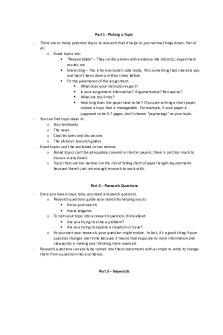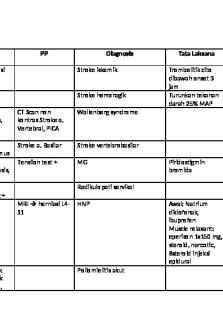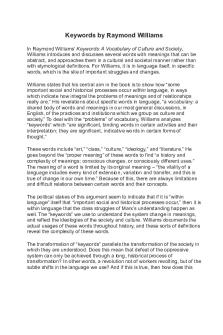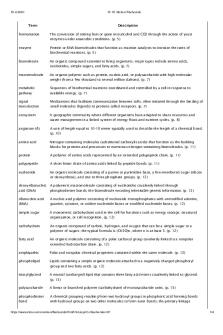Topics and Keywords PDF

| Title | Topics and Keywords |
|---|---|
| Course | Library Research |
| Institution | Utah Valley University |
| Pages | 2 |
| File Size | 54.3 KB |
| File Type | |
| Total Downloads | 30 |
| Total Views | 158 |
Summary
online assignment...
Description
Part 1 - Picking a Topic -
-
-
There are so many potential topics to research that it helps to just narrow things down, first of all. o Good topics are: “Researchable” – They can be proven with evidence like statistics, experiment results, etc. Interesting – This is for everyone’s sake really. Pick something that interests you and hasn’t been done a million times before. Fit the parameters of the assignment What does your instructor expect? Is your assignment informative? Argumentative? Persuasive? What are the limits? How long does the paper have to be? If you are writing a short paper, choose a topic that is manageable. For example, if your paper is supposed to be 5-7 pages, don’t choose “psychology” as your topic. You can find topic ideas in: o Your textbooks o The news o Class lectures and discussions o The Library’s research guides Good topics can’t be too broad or too narrow. o Broad topics can’t be adequately covered in shorter papers; there is just too much to discuss in any detail. o Topics that are too narrow run the risk of falling short of paper length requirements because there’s just not enough research to work with.
Part 2 – Research Questions -
-
Once you have a topic idea, you need a research question. o Research questions guide your search by helping you to: Focus your search Avoid tangents o To turn your topic into a research question, think about: Are you trying to solve a problem? Are you trying to explore a situation or issue? o As you start your research, your question might evolve. In fact, it’s a good thing if your question changes over time because it means that exposure to more information and viewpoints is making your thinking more nuanced. Research questions can easily be turned into thesis statements with a simple re-write to change them from a question into a sentence.
Part 3 – Keywords
-
-
Keywords describe your topic. o They are the most important words in your research question(s) and topic. o Databases don’t understand words. When they search, they are really only looking for letters in a particular order that match what you typed in. o There are a lot more words that might be good keywords than you initially think of. As you search, keep your eyes open for more words that might be useful. Creating Keywords o Here are some strategies for creating keywords from your topics and research questions: Get rid of everything except the nouns Look for synonyms Use reference books like, thesauri, dictionaries, or encyclopedias to get ideas Identify populations, concepts, events Keep an eye out for keywords as you search Spider graphs o But remember to keep things simple. Keywords shouldn’t be longer than two ro three words
Part 4 – Jargon -
Not all keywords are created equal Banned Keywords o In addition to jargon, sometimes there are words that don’t work the way you expect them to or don’t work at all: Versus Pro Con In With Of About Comparison Contrast Definition Benefits, pros Negatives, cons...
Similar Free PDFs

Topics and Keywords
- 2 Pages

Keywords UKMPPD
- 43 Pages

Romanticism- Keywords
- 3 Pages

BUS201 Keywords
- 5 Pages
![[07.1] Live de keywords](https://pdfedu.com/img/crop/172x258/zwrgkope9k31.jpg)
[07.1] Live de keywords
- 82 Pages

Keywords by Raymond Williams
- 2 Pages

Topics and Arguments Assignment
- 2 Pages

Biokemi keywords samlet
- 29 Pages

Assignment Topics and rubrics
- 3 Pages

Ransom AND Invictus Topics
- 2 Pages

Ppsc books and topics
- 6 Pages

Keywords of art history terms
- 2 Pages

Discussion Topics 17 and 18
- 2 Pages

Case studies and relevant topics
- 16 Pages

Essay Topics
- 8 Pages

Debate Topics
- 1 Pages
Popular Institutions
- Tinajero National High School - Annex
- Politeknik Caltex Riau
- Yokohama City University
- SGT University
- University of Al-Qadisiyah
- Divine Word College of Vigan
- Techniek College Rotterdam
- Universidade de Santiago
- Universiti Teknologi MARA Cawangan Johor Kampus Pasir Gudang
- Poltekkes Kemenkes Yogyakarta
- Baguio City National High School
- Colegio san marcos
- preparatoria uno
- Centro de Bachillerato Tecnológico Industrial y de Servicios No. 107
- Dalian Maritime University
- Quang Trung Secondary School
- Colegio Tecnológico en Informática
- Corporación Regional de Educación Superior
- Grupo CEDVA
- Dar Al Uloom University
- Centro de Estudios Preuniversitarios de la Universidad Nacional de Ingeniería
- 上智大学
- Aakash International School, Nuna Majara
- San Felipe Neri Catholic School
- Kang Chiao International School - New Taipei City
- Misamis Occidental National High School
- Institución Educativa Escuela Normal Juan Ladrilleros
- Kolehiyo ng Pantukan
- Batanes State College
- Instituto Continental
- Sekolah Menengah Kejuruan Kesehatan Kaltara (Tarakan)
- Colegio de La Inmaculada Concepcion - Cebu